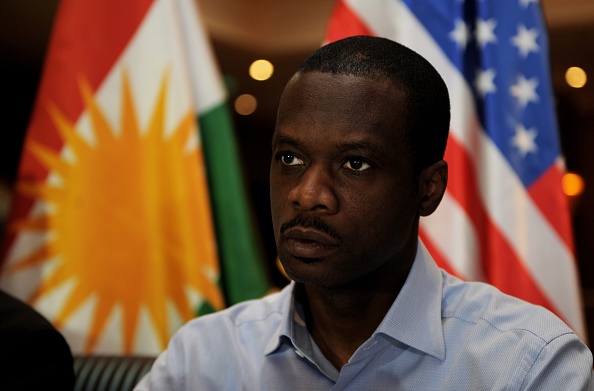Hip-hop star seeks new trial over lawyer's alleged use of artificial intelligence to draft closing argument

Prakazrel “Pras” Michel, a member of the hip-hop group Fugees, is seen during a press conference at a hotel in Erbil, Iraq, in July 2015. Photo by Hamit Huseyin/Anadolu Agency/Getty Images.
Prakazrel “Pras” Michel, a member of the hip-hop group Fugees, has said he is entitled to a new trial partly because his former lawyer used an experimental artificial intelligence program to draft an inadequate closing argument.
A new-trial motion filed by Michel’s new lawyers said the closing included “frivolous arguments,” misunderstood the required elements of the crimes, and “failed to highlight key weaknesses in the government’s case.”
Reuters, Politico and the Hollywood Reporter are among the publications with coverage.
“At bottom,” the new-trial motion said, “the AI program failed [Michel’s defense counsel, David] Kenner, and Kenner failed Michel.”
Michel was convicted in April in an alleged back-channel lobbying campaign that included a conspiracy to make straw campaign donations. The campaign was allegedly aimed at getting the United States to drop a fraud investigation and prosecution of a fugitive financier in connection with the collapse of the sovereign wealth fund 1MBD.
The brief by Michel’s new lawyers from ArentFox Schiff alleges that, during the closing:
• Kenner, Michel’s former lawyer, appeared to admit guilt when he told jurors: “Ladies and gentlem[e]n, this case started back in 2012 when there was, as the government characterizes it, an effort to funnel money to President Obama’s reelection campaign.”
• Kenner argued that Michel made campaign donations to help the financier get a photo with former President Barack Obama, not to influence policy. The reason why the financier wanted to funnel money to the Obama reelection campaign was immaterial to the alleged conduit scheme. The reason for the contribution was an issue in an alleged lobbying scheme. The closing appeared to conflate both schemes.
• Kenner “failed to make the strongest and most obvious argument” to a charge alleging that Michel acted as an unregistered agent of a foreign government. Kenner should have alleged that there was no evidence Michel acted under the “direction or control” of the Chinese government.
• Kenner argued that the Trump administration was not influenced by Michel, in the apparent mistaken belief that success was a required element of the unregistered foreign agent charge.
A press release issued after Michel’s trial said the AI program EyeLevel.AI was used in Michel’s trial, the first use of such a program in a federal trial.
The press release said EyeLevel.AI was launched with CaseFile Connect. Kenner said in the press release the AI program “turned hours or days of legal work into seconds.”
Michel’s former publicist allegedly told Michel’s new lawyers that Kenner stated at the end of the trial that AI wrote the closing.
The new-trial motion said Kenner and his co-counsel appear to have an undisclosed financial interest in CaseFile Connect. As evidence, the brief cited overlapping addresses for the former lawyers and CaseFile Connect.
Kenner did not immediately respond to the ABA Journal’s emailed request for comment.
EyeLevel.AI sent Reuters a statement that said neither Kenner nor another defense attorney on the case, Alon Israely, have a financial stake in the AI program. The statement said EyeLevel.AI is a powerful tool with the ability “to ingest and understand complex legal transcripts based solely on the facts of the case as presented in court.”
Write a letter to the editor, share a story tip or update, or report an error.



